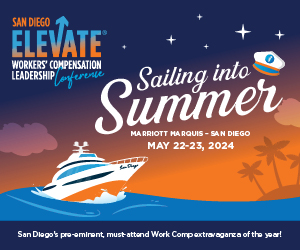Industry Insights
November 29, 2017
Gold: Reducing WC Admin Costs, TCOR and One-Day Settlements
- National
- - Popular with: Legal
- - 0 shares
We have a problem in the workers' compensation industry. It’s an expensive, inefficient and time-consuming problem. This problem involves an archaic process that nobody likes, but to which everyone continues to subscribe.

Paul Gold
In working toward the resolution of workers' compensation claims, insurance carriers and third-party administrators majorly overspend through a process they have been utilizing for decades. This outrageously expensive process is somehow prioritized before a simple examination of the overall spend for the total cost of risk (TCOR) incurred.
The strategic management on new or long-term claims of dispute have a direct impact on the administrative costs incurred per claim, as all claims are unique. But the current process utilized in the industry does not allow for this strategy.
Insurers and TPAs take the same course of action and rarely change their position once litigation on a disputed claim has begun. This inefficient approach — from the over-utilization of independent medical exams and physician evaluation services, to the endless legal fees — contributes to a vast array of unnecessary administrative costs.
When aiming to settle a case for a specific reserve mark, all carriers lose sight of the big picture with regard to costs incurred for the claim. The majority of these claims could have been settled prior, at a fraction of the expense.
Let’s take, for example, a case open over two years, moving to three, in which a claimant is hitting maximum medical improvement with a disputed claim of permanency. The carrier has set the reserve mark at $30,000. However, the claimant and his counsel have requested to settle for $50,000, or just medical rights, using a set-aside account when required.
Scenarios like this one occur all the time, and the result is often the same. The carrier’s stance on the reserve mark continues to produce additional administrative expenses, which could be easily avoided. This is simply not a cost-effective model.
Taking only the industry national averages, an insurer may occasionally achieve the reserve mark of $30,000 at the end of litigation. However, by this point (hopefully the third year into the disputed claim), the insurer's administrative costs alone easily surpass $60,000.
So what was truly accomplished here? The carrier hits the reserve mark years later. If it is lucky, this occurs in the third year of the disputed case. Given this “lucky” scenario, the carrier has overspent by tens of thousands. Each year added increases the expenses exponentially. Now that we have an idea of the problem, how could this have been avoided?
When an insurance carrier offers a low settlement, and the claimant’s counsel rejects the offer, administrative costs increase. Upon the aging of a claim, the carrier may eventually decide to offer more money to obtain a release of settlement, thus eliminating further risk exposure.
This is recognized as a greater immediate cash flow expense. In the long run, however, this actually reduces the carrier's administrative costs and will be realized upon an insurer’s future TCOR review. Introducing this process earlier would provide a TCOR reduction. Unfortunately, it’s not quite that simple.
Before we can solve the financial problem, we must first look beyond the finances. As claims age, we’ve established that a breakdown in strategy exists within the insurer’s company, perpetuated by the existing model. Additionally, a breakdown in trust occurs among the claimant, the adjuster and the carrier. The longer the litigation process takes, the more this mistrust spreads.
Eventually, the claimant sees the dispute as a never-ending cycle, often resulting in mistrust between the claimant and even his own counsel. No winners emerge from this all-too-common scenario. The takeaway here is that the loss of trust is a catalyst for further inflation of expenses.
How do we free carriers from using such an archaic model for settlements in the 21st century? No attorney or adjuster can understand what a claimant has been through, unless he has endured the same experience within the system — the experience of navigating his own workers' comp disability. So is it even possible to restore trust in order to resolve matters swiftly and affordably?
There is indeed a more efficient and cost-effective approach to workers' compensation settlements today. This approach creates an environment in which saving money and restoring trust are not mutually exclusive ideas.
When a common bond can be established between the claimant and a private mediator, settlements can be reached within one meeting. The goal is to achieve a middle ground by allowing the claimant to feel heard by someone who can empathize with the experience. The result is a single-day resolution of the claim, thus reducing the carrier's administrative costs and eliminating the risk exposure entirely.
Paul Gold is founder of PG Resolutions Group LLC in Tampa, Florida. This column appears with permission.
Advertisements
Columns
- Snyder: Public Benefit Rules Have Changed, but It Might Not Make a Difference 04/12/24
- Headrick: Clearing Up a Common Misconception 04/11/24
- Snyder: Litigation Guidelines Should Define Four Settlement Triggers 04/10/24
- Kirsch: Depositions of Comp Carrier Employees After Intervening in Third-Party Actions 04/09/24
- Wilson and Bennett: Could AI Have Prevented the Opioid Crisis in Workers' Comp? 04/08/24
- Moore: Pandemic Effect Over in March 2027. Really? 04/05/24
- Geaney: A Brief History of Our State's Workers' Compensation Act 04/04/24
- Kamin and Larres: Significant Panel Decision Clarifies Recon Confusion 04/03/24
- Gelman: Exposed to 'Forever Chemicals' 04/02/24
- Montgomery: Cyberattack Delays Payment of San Francisco Bills 04/01/24
- Young: Indoor Heat Regs in Turmoil 03/29/24
- Langham: Shootings and Compensability 03/27/24
- Geaney: Third-Party Liens Not Always Due Right Away 03/26/24
- Larres: State Supreme Court Denies Review of Our Appellate Win 03/25/24
- Moore: Recordkeeping and Your Remote Premium Auditor 03/22/24
- Switzer: Important Change Coming Soon 03/21/24
- Moore: Basic AI Claims Adjuster Assistant Works Well 03/19/24
- Montgomery: Availity to Return Providers' Bills 03/18/24
- Kamin: New Bill Would Clarify and Allow More Electronic Signatures 03/15/24
- Snyder: How Thorough Do You Have to Be? 03/14/24
Now Trending
- Workers' Compensation News
-
Calif. WCAB
Proposes $40k in Sanctions, Alleges
Pattern of Misusing Recon to Delay…
Posted on Apr 11, 2024
-
Calif. Committee
Passes TD Expansion, Ag Worker
Protection…
Posted on Apr 12, 2024
-
Calif. Senate
Committee Hears Comp Bills…
Posted on Apr 10, 2024
-
Calif. Worker
Waits Too Long to Sue Over Alleged
Chemical Exposure…
Posted on Apr 12, 2024
-
Calif. Contractor
Pleads Guilty to Underreporting…
Posted on Apr 15, 2024
-
Ill. Traveling
Employee Gets Award for Injuries
From Fall Down Stairs at…
Posted on Apr 10, 2024
-
Ill. Worker Who
Repeatedly Failed to Appear at
Hearings Can't Get Claim…
Posted on Apr 15, 2024
-
S.C. Supreme Court
Expresses 'Profound Concern' With
Administrative Denial of…
Posted on Apr 12, 2024
-
N.Y. Business
Owner Accused of $236,515 Premium
Fraud…
Posted on Apr 10, 2024
-
Neb. Lawmakers
Send Schedule Rating Bill to…
Posted on Apr 15, 2024
Jobs
Upcoming Events
May 5-8, 2024
Risk World
Amplify Your Impact There’s no limit to what you can achieve when you join the global risk managem …
May 13-15, 2024
NCCI's Annual Insights Symposi
Join us May 13–15, 2024, for NCCI's Annual Insights Symposium (AIS) 2024, the industry’s premier e …
May 13-14, 2024
CSIA Announces the 2024 Annual
The Board of Managers is excited to announce that the CSIA 2024 Annual Meeting and Educational Con …
Social Media Links
c/o Business Insurance Holdings, Inc.
Greenwich, CT 06836





No Comments
Log in to post a comment